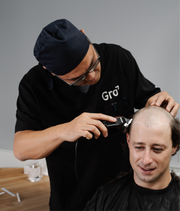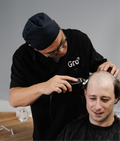Semaglutide drugs Ozempic® and Wegovy® have become household names in the weight-loss world. But alongside their meteoric rise, a troubling trend has emerged: hair thinning and shedding among users. Social media is buzzing with stories but what’s really going on - and what can you do about it?
Is hair loss an official side effect of Ozempic and Wegovy?
Interestingly, hair loss isn’t listed as an official side effect in the prescribing information for either Ozempic or Wegovy.
However, a pre-print study of Wegovy (a higher-dose version of semaglutide) reported hair loss in about 3% of participants, compared to 1% on placebo (note that this was not peer reviewed).
A large-scale analysis presented at the European Academy of Dermatology and Venereology (EADV) found that users of GLP-1 receptor agonists (the drug class these drugs belong to) had significantly higher rates of telogen effluvium (TE) and androgenic alopecia (AGA) compared to non-users. Another study revealed that semaglutide users were 50% more likely to experience hair loss than those on other weight-loss medications.
Why does Ozempic cause hair loss?
The consensus is that Ozempic and similar drugs don’t directly damage hair follicles. Instead, the culprit is the rapid weight loss and metabolic changes triggered by the drug.
Here’s how it works:
1. Telogen effluvium (stress-induced shedding)
When the body experiences sudden stress (such as losing a significant amount of weight quickly) it prioritises vital organs over hair growth. This pushes many follicles into the resting (telogen) phase, leading to diffuse shedding a few months later.
2. Nutritional deficiencies
Ozempic suppresses appetite, which can lead to caloric restriction and nutrient gaps. Deficiencies in protein, iron, zinc, and B vitamins are well-known contributors to hair thinning.
3. Hormonal and metabolic shifts
GLP-1 drugs influence insulin and other hormones, which may indirectly disrupt the hair growth cycle. While this effect is less understood, it’s another piece of the puzzle.
Is it permanent?
The good news: Ozempic-related hair loss is usually temporary. Most cases fall under telogen effluvium, which resolves once the body adapts and weight stabilises. Regrowth typically occurs within 3-6 months, though ongoing weight loss can prolong shedding.
However, if you already have underlying pattern baldness (androgenic alopecia), there is speculation that Ozempic may accelerate its progression. In these cases, professional intervention is key.
What can you do about it?
When you’ve worked hard to lose weight, it can be distressing to discover that you’re facing the unexpected side effect of hair loss. Gro Clinics is here to help you.
1. Comprehensive diagnosis
Not all hair loss is the same. Our clinicians use advanced scalp analysis to determine whether you’re dealing with telogen effluvium, androgenic alopecia, or both.
2. Nutritional support
We guide you on restoring essential nutrients, such as protein, iron, zinc, and vitamins, through diet or supplementation. This is critical for reversing deficiency-driven shedding.
3. Evidence-based treatments
Depending on your needs, we may recommend:
- Minoxidil to help stimulate regrowth
-
Microneedling for scalp rejuvenation and growth factor release
- Hair transplants for permanent restoration in severe genetic hair loss cases (read more about our PFP Protocol)
4. Advanced therapies for consistent results
Gro Clinics offers advanced therapies, including:
-
Exosome therapy: Exosomes are tiny extracellular vesicles packed with growth factors and signalling molecules that promote cellular repair and regeneration. When applied to the scalp, they can help stimulate dormant follicles, improve scalp health, and accelerate recovery from telogen effluvium or chronic thinning.
- Fotona HAIRestart® Laser: This non-invasive laser treatment is of a different calibre compared to other laser treatments available for hair growth. Focused thermal energy helps to activate follicle metabolism, improves blood flow, and extends the hair growth phase. It can be particularly helpful for patients with metabolic stress or hormonal changes, seeking a consistent method to strengthen hair growth without downtime.
Download our Women’s Guide to Understanding Hair Loss
The bottom line
Ozempic and Wegovy have helped many people lose weight and reduce health risks, but the unintended side effect of hair loss is real and increasingly common. If you’re noticing thinning or shedding, don’t panic. With the right diagnosis and treatment plan, hair recovery is possible.
At Gro, we’re at the forefront of hair restoration science. Whether your hair loss is temporary or part of a bigger picture, we have the expertise and solutions, including Exosome Therapy and Fotona HAIRestart® Laser, to help you move forward.
Disclaimer
All information is general and not intended as a substitute for professional advice. Results may vary. Gro Clinics does not prescribe weight-loss medications.
References
Sodhi, M., Rezaeianzadeh, R., Kezouh, A., Frey, C., & Etminan, M. (2025, March 6). Risk of hair loss with semaglutide for weight loss [Preprint]. medRxiv. https://doi.org/10.1101/2025.02.23.25322568, [Accessed 4 November 2025]
Freeman, S. (2025, September 17). Telogen effluvium and androgenic alopecia rates high among GLP‑1 receptor agonist users. Medscape Medical News. https://www.medscape.com/viewarticle/telogen-effluvium-and-androgenic-alopecia-rates-high-among-2025a1000oo9?form=fpf, [Accessed 4 November 2025]
Rudy, M. (2025, April 3). Ozempic, other semaglutides linked to hair loss: Here’s what to know. Fox News. https://www.foxnews.com/health/ozempic-other-semaglutides-linked-hair-loss-heres-what-know, [Accessed 4 November 2025]
Chang, H. (2025, August 20). 5 Wegovy alternatives to consider for weight loss. GoodRx. https://www.goodrx.com/wegovy/alternatives, [Accessed 4 November 2025]
Cleveland Clinic. (2025). Does Ozempic cause hair loss? What we know. Cleveland Clinic Health. https://health.clevelandclinic.org/does-ozempic-cause-hair-loss, [Accessed 4 November 2025]
Lewin, J. (2024, August 9). Telogen effluvium: Symptoms, treatment, and recovery. Medical News Today. https://www.medicalnewstoday.com/articles/321590, [Accessed 4 November 2025]
Almohanna HM, Ahmed AA, Tsatalis JP, Tosti A. The Role of Vitamins and Minerals in Hair Loss: A Review. Dermatol Ther (Heidelb). 2019 Mar;9(1):51-70. doi: 10.1007/s13555-018-0278-6. Epub 2018 Dec 13. PMID: 30547302; PMCID: PMC6380979. https://pmc.ncbi.nlm.nih.gov/articles/PMC6380979/, [Accessed 4 November 2025]
Kobren, S. D. (2023, May 15). Misuse of Ozempic for rapid weight loss can cause significant and perhaps permanent hair loss [Commentary]. Dermatology Times. https://www.dermatologytimes.com/view/misuse-of-ozempic-for-rapid-weight-loss-can-cause-significant-and-perhaps-permanent-hair-loss, [Accessed 4 November 2025]

















